16 January 2017 Edition
British Government’s legacy of cover-up a toxic stream of lies
World-renowned barrister and human rights advocate Michael Mansfield QC delivers McGurk’s Bar Memorial Lecture
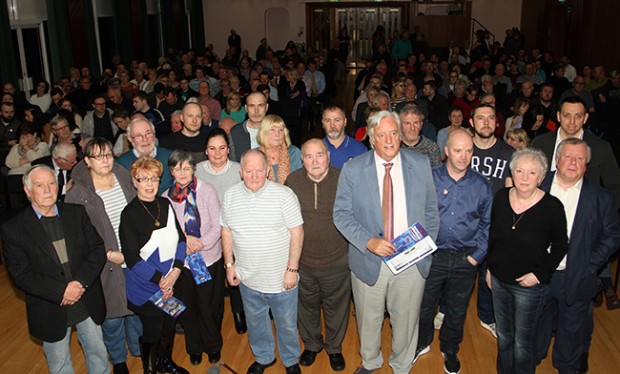
• Human rights barrister Michael Mansfield QC at the McGurk’s Bar Memorial Lecture in Belfast with relatives of the victims
Mansfield put the Unionist Government and successive British governments in the dock
WHEN MICHAEL MANSFIELD strode up to the lectern in St Mary’s University College in Belfast to deliver the McGurk’s Bar Memorial Lecture, he scanned the audience through squinted eyes before asking theatrically: “Mr Hamilton, are you out there?”
His question was rhetorical, akin to a piece of courtroom drama, because the leading English QC knew that PSNI Chief Constable George Hamilton hadn’t taken up the open invitation to face the questions to be posed by the families of the 15 people killed in the UVF bombing of McGurk’s Bar in North Queen Street, Belfast, on 4 December 1971.
Nor would the PSNI Chief Constable hear Mansfield use his famous legally-forensic mind to deliver a lecture that not only indicted the PSNI over its contemporary handling of the McGurk’s case but, by his inaction, that he was undermining any trust the families might have in the PSNI and its ability to deliver on new policing.
Speaking without notes, Mansfield used his lecture to put the Unionist Government of the day, successive British governments, the British Army and the RUC (predecessors of the PSNI) metaphorically in the dock over the way they have scapegoated people who have suffered at the hands of their state apparatus.
Mansfield’s list included the McGurk’s families, Ballymurphy Massacre families, Birmingham Six, Guildford Four, Stephen Lawrence’s family, and the 96 Liverpool soccer supporters killed in the Hillsborough Stadium Disaster.
But Mansfield moved into his lecture by referring to a BBC programme aired the previous night, Monday 5 December, that examined the case of Mark Duggan, who was shot dead by police in London in August 2011.
The 29-year-old, born in Tottenham in 1981, was shot at close range in “an exchange of fire”, according to police – yet the gun that he was alleged to have on him when he was killed was found “some distance away in a park”.
So the “taint”, Mansfield said, that he was a gunman firing at police frames the debate around the killing.
And, similarly, with those killed in McGurk’s. The “intelligence” said the bomb was an IRA bomb and ‘some of those killed were involved with the IRA’; Mark Duggan was ‘a gunman’; the dead of Hillsborough were “drunk . . . had no tickets”.
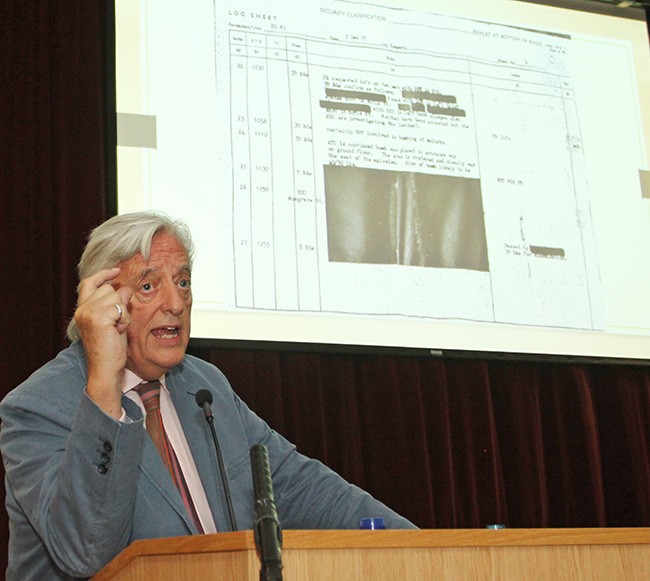
Turning to the recent revelations based on documents uncovered by researcher Ciarán Mac Airt of the charity Paper Trail (and whose grandmother Kathleen Irvine was killed in the McGurk’s explosion), the leading barrister said:
“This is massive.”
One document, a log from the British Army’s headquarters (HQNI Log) written in the hours after the bombing, notes that a military bomb expert contradicts the official story that the seat of the explosion was in the bar.
The document is heavily redacted. In the aftermath of the attack on McGurk’s, Mansfield the barrister declares, it proves that the Unionist government of the day, successive British governments, the British Army and the RUC were telling lies.
“They were putting out a false story,” he said.
“If [in the hours after the explosion] they didn’t appreciate what the army was saying . . . they knew the next day it was wrong,” said Mansfield, yet they persisted in what he described as “a toxic stream of lies”.
Mansfield challenged the PSNI Chief Constable to look at the document and analyse “the truth of it”.
The leading QC cast his gaze further afield as he focused on those at the heart of the “toxic stream of lies”.
When he asked “Mr Hamilton are you out there?” he could have been directing his question at British governments, past and present, who have all assiduously worked to evade their responsibility when it comes to dealing with legacy issues.
Mansfield encouraged the McGurk’s families in the audience, saying that, over the years, it was people like them whose “persistence” wrought changes from the system.
And, in conclusion, he again challenged PSNI Chief Constable Hamilton “as the custodian of the people’s trust” to give the families what they deserve.
Mr Hamilton, are you listening?
Pressure mounts on Britain over legacy issues
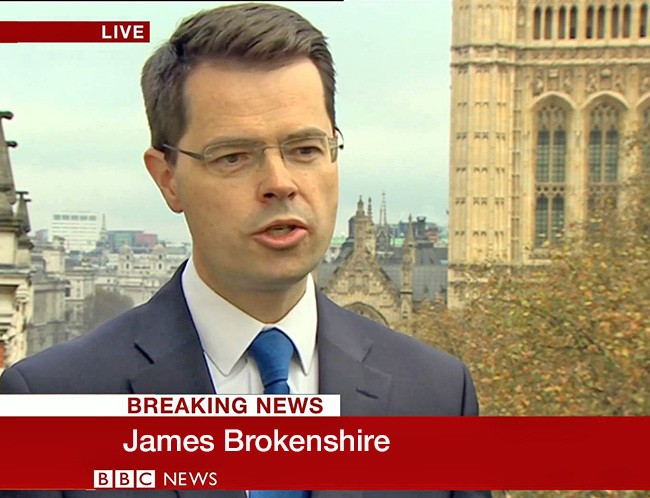
• British Secretary of State James Brokenshire – playing a modern-day version of the ‘Orange Card’
‘THE LITTLE DUTCH BOY’ plugging the hole in the dyke with his finger springs to mind when the British Secretary of State, James Brokenshire, takes to the airwaves to say that the British Government wants “broad political consensus” before publishing any proposals for dealing with the past.
For most observers this is tantamount to the British Government playing a modern-day version of the ‘Orange Card’ as they know that Arlene Foster’s Democratic Unionist Party (which is looking over its electoral shoulder at the atavistic Jim Allister’s Traditional Unionist Voice as well as the DUP's own hardliners) is stonewalling any progress on legacy issues.
It's Arlene Foster, after all, who has been preventing Lord Chief Justice Morgan’s proposal to fund legacy inquests to be discussed at the North’s Executive table, allowing the British to hide behind the “no political agreement” excuse.
Sinn Féin’s Gerry Kelly MLA said the British Government “can end its stalling” on dealing with legacy issues overnight by implementing the mechanisms set out in the Stormont House Agreement.
“Sinn Féin has tried on over a dozen occasions this past year to engage the British Government in a serious negotiation on dealing with the legacy of the past,” the Assembly member for North Belfast said.
“The British Government has refused to deal with the core issues of ending the NIO veto over disclosure of information to families, just as they have stopped the release of funding for legacy inquests, as requested by the Lord Chief Justice.”
Things are looking no better for the British on the international stage either.
The Committee of Ministers to the Council of Europe – which is scrutinising Westminster’s failure to address legacy issues – has expressed concern that the Historical Investigations Unit and other legacy institutions agreed upon in December 2014 have still not been established, two years later.
Embarrassingly for Secretary of State Brokenshire, this became public within hours of his comments on legacy issues in early December.
Responding to the Council of Ministers’ findings from Strasbourg, Mark Thompson of Relatives for Justice said:
“The very clear frustrations expressed by Europe reflect the deep sense of disappointment felt by thousands of relatives seeking truth and accountability from across the community.
“In the face of constant delay, Europe, the Council of Ministers, is one of the few international mechanisms in which families can independently hold to account the UK Government.
“The Council of Ministers also demonstrates the fundamental importance of independence when concerning legacy institutions such as the Historical Investigations Unit which the UK has reacted most to by seeking to block families’ right to know about the killings of their loved ones by trying to establish a ‘national security’ veto.”
Relatives for Justice said that the demands by the Council of Ministers, the body directed by the European Court, fly in the face of James Brokenshire’s remarks in which he stated that he is not for doing anything on legacy “citing more unacceptable excuses as to why he won’t proceed – but the real reason is that his government seeks to hide the truth”.
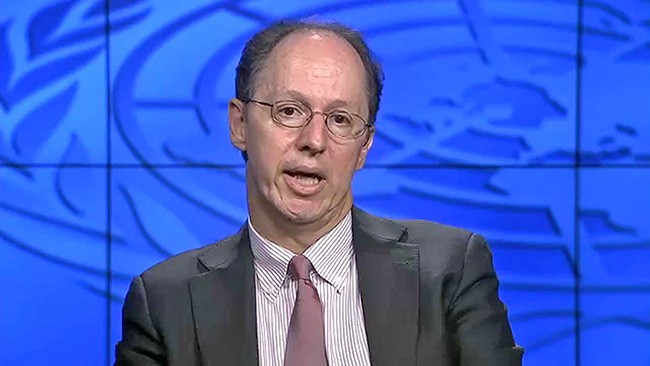
• UN Special Rapporteur Pablo De Greiff – called for effective resources to address legacy cases
United Nations Special Rapporteur Pablo De Greiff, in his report on the “promotion of truth, justice, reparation and guarantees of non-recurrence”, warned the British Government that it cannot use professed national security concerns to override its obligations to provide information about the past.
The UN rapporteur also called for the full implementation of the mechanisms agreed at Stormont House, including the provision by Westminster of effective resources enabling them to function correctly.
Alongside these international reports, the North’s Criminal Justice Inspectorate on 8 December was critical of the PSNI’s delaying tactics in providing information to inquests.
And with Irish Government Foreign Affairs Minister Charlie Flanagan in December surprisingly chastising the British over the delays in establishing the institutions to deal with the legacy of the past, it certainly is a difficult time for the British Establishment trying to hold back the tide on legacy issues.
The past and a foreign country
WRITING in the arts and literature quarterly magazine, the White Review, in 2013, Natasha Hoare quotes the famous opening line of L. P. Hartley’s novel, The Go-Between – “The past is a foreign country; they do things differently there” – and says that this “wistfully condenses the problems inherent to memory and history”.
She continues:
“Distant, intangible, unreliable, lost, our histories, at the levels of personal and national, are at best half-remembered and at worst actively misrepresented.”
And in the context of the North and the intense political struggle over legacy issues, her remarks have a ring of truth to them, especially her view that the past is actively misrepresented.
And so it is, with the British and unionists constantly accusing republicans of attempting to rewrite history to establish theirs as the dominant narrative of the conflict. What we as republicans see in this strategy is our political opponents distorting history and memory to absolve themselves of any responsibility for the decades of conflict that we have just experienced following the imposition of partition and the Orange State.
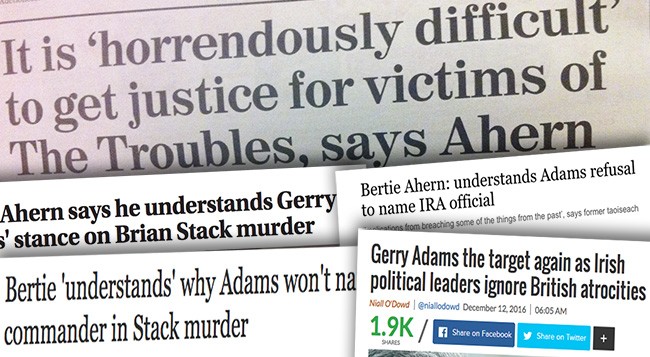
Yet if we look behind this ‘blame game’ strategy (‘republicans are to blame for it all’), we also see a framework where the British and unionists are establishing an ideological justification for the war they waged against the republican, nationalist and Catholic community.
As this ideological struggle intensifies, the Southern Establishment has shown its neo-colonial colours with both Fianna Fáil and Fine Gael politicians constantly attacking Sinn Féin. They have clearly demonstrated again in recent weeks that, when it comes to the serious topic of legacy, playing party politics is paramount, regardless of the damage it might do to honest attempts to assist in truth recovery or the Peace Process.
The cynical exploitation by the leaders of Fine Gael and Fianna Fáil of the family of Portlaoise Chief Prison Officer Brian Stack, shot dead by IRA Volunteers in an unauthorised operation in 1983, is a case in point, especially in their focus on Sinn Féin President Gerry Adams TD, who took political risks to try and help the family rather than take the easy option of turning them away with a glib excuse.




